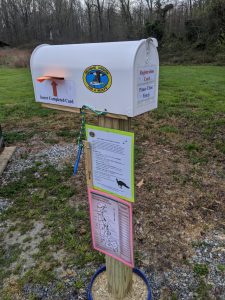Hunters in Delaware harvested 567 wild turkeys during the state’s spring season which ran from April to May, with the biggest gobbler taken weighing 25 lbs., 14 oz./USFWS photo
Hunters reported harvesting 567 wild turkeys during Delaware’s month-long spring turkey season, which is 7.4% lower than the 2021 hunting season, the Department of Natural Resources and Environmental Control announced today. While the 2022 harvest was slightly lower, it was generally consistent with and in the range of annual turkey harvests over the past decade – during which time the wild turkey came into focus as one of the state’s greatest conservation management stories after a restoration effort in the mid-1980s returned this iconic native gamebird to Delaware for the first time since the late 1800s.
Harvest during each week of the month-long season was similar to previous years, with 268 turkeys (47.3%) harvested during the first week, 104 (18.3%) during the second week, 73 (12.9%) during the third week and 94 (16.6%) during the last week of the season, with 28 (4.9%) harvested during the special one-day hunting opportunity provided to youth and non-ambulatory adult hunters on the Saturday prior to the turkey hunting season.
Delaware’s bag limit is one turkey per hunter per year and only the harvest of turkeys with beards – almost always males – during the state’s spring-only turkey hunting season. Despite their rarity, four turkey hens with beards were harvested by Delaware hunters in 2022. Other season highlights included the harvest of 52 “non-typical” turkeys, consisting of gobblers with more than one beard. Of the birds with multiple beards, 38 had two beards, six had three beards and eight had four beards. The longest recorded beard was 13 inches, and the longest spurs on a harvested bird were 1.75” on the right leg and 1.875” on the left leg. The heaviest turkey harvested was 25 lbs. 14 oz, taken on private property located in Wildlife Management Zone 6 in Kent County.
Turkeys were harvested in 17 of 18 Delaware wildlife management zones. A wild turkey harvest “hot spot” occurred along a corridor of nine management zones, consisting of and stretching from zones 4, 6, 7 and 8 in western Kent County through zones 9, 11, 12, 14 and 16 in Sussex County, which accounted for 73.4% of the total harvest in the state. Zone 1A, which is in New Castle County north of Interstate-95/I-295, was the only zone where turkeys were not harvested.
This year, 468 turkeys were harvested on privately-owned lands and 98 on public lands (harvest location of one turkey is unknown). Quality hunting opportunities on public land were widely available statewide and was rewarding for numerous hunters as evidenced by turkeys being harvested from 19 different public land areas.
For hunters planning ahead, the 2023 wild turkey hunting season will open Saturday, April 8 and run through Saturday, May 6, with the special day for youth and non-ambulatory hunters set for Saturday, April 1. Hunters planning to hunt public lands should submit a public lands turkey lottery application, with information available in the 2022/2023 Delaware Hunting & Trapping Guide. Hunters are required to successfully complete a turkey hunter education class before hunting wild turkeys in Delaware and before applying for a permit to hunt on public lands, with additional information available at Delaware Hunter Education Courses.
Hunting season and state wildlife area information is available in the 2022/2023 Delaware Hunting & Trapping Guide or by calling the DNREC Division of Fish and Wildlife’s Wildlife Section at 302-739-9912. Information on hunting licenses and the Conservation Access Pass is available at de.gov/huntinglicense or by calling the DNREC Division of Fish and Wildlife Recreational Licensing office at 302-739-9918.
About DNREC
The Delaware Department of Natural Resources and Environmental Control protects and manages the state’s natural resources, protects public health, provides outdoor recreational opportunities, and educates Delawareans about the environment. The DNREC Division of Fish and Wildlife conserves and manages Delaware’s fish and wildlife and their habitats, and provides fishing, hunting, wildlife viewing and boating access on nearly 68,000 acres of public land. For more information, visit the website and connect with @DelawareDNREC on Facebook, Twitter or LinkedIn.
Media Contacts: Nikki Lavoie, nikki.lavoie@delaware.gov; Michael Globetti, michael.globetti@delaware.gov
###
